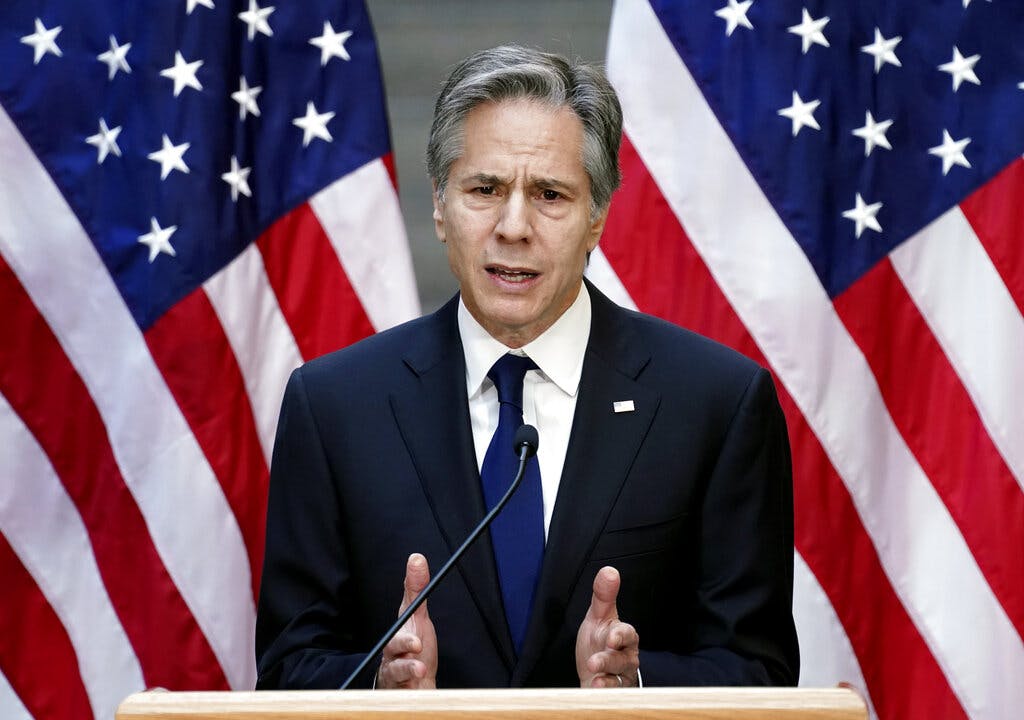America Finds Itself Odd Man Out Amid Frantic Mideast Diplomacy Aimed at Iran
Secretary of State Blinken is scheduled to join the summit in the hope of adding America into the hectic diplomatic mix it has so far missed.

This morning’s attack on Saudi oil facilities at Jeddah comes amid frantic Mideast diplomacy to deal with major shifts in the global balance of power — and America is emerging as the odd man out.
The scramble saw Israel’s prime minister, Nafthali Bennet, dash to Sharm El Shaikh, Egypt, where he conferred for two days behind closed doors with Egypt’s strongman, President Abdel Fatah al Sissi, and the Abu Dhabi crown prince, Mohamed bin Zayed.
Today at Aqaba, the Hashemite king, Abdallah of Jordan, hosted MbZ, President al-Sissi, and Iraq’s prime minister, Mustafa Al Kadhimi. Earlier, in a gesture that stunned Washington, Abu Dhabi hosted Syria’s president, Bashar al-Assad, a war criminal.
Until now, Mr. al-Assad was shunned by the Arab world. So the meeting is clearly noteworthy. The UAE also tried, apparently unsuccessfully, to convince Israel to appease Mr. Assad.
On top of all this, Israel’s foreign minister, Yair Lapid, announced today that on Sunday and Monday he would conduct a series of talks with the foreign ministers of Morocco, Bahrain, and the UAE — and do so in Israel. This time, Secretary of State Blinken is scheduled to join the summit in the hope of adding America into the hectic diplomatic mix it has so far missed.
Pictures from the meetings are likely to feature broad smiles. The word “historic” could well be bandied around. Mr. Blinken is apt to take credit for uniting former enemies — even though the 2020 Abraham Accords that facilitated peace treaties between former enemies was orchestrated by President Trump.
Mr. Blinken’s demarche, though, is more stagecraft than statecraft. Behind closed doors the American state secretary must be ready to hear complaints. The Emiratis, for one, are furious at President Biden for, in one of his first acts as president, taking the Iran-backed Yemeni group, the Houthis, off the State Deparment’s terrorist list.
This morning’s missile attack on the Saudis was claimed by the Houthis. Responding to previous attacks on Saudi and Emirati targets, State Department officials said they were an act of “terror.” Mr. Biden failed spectacularly when he attempted to end the Yemen war by coddling Iran while snubbing the Saudis and Emiratis. Yet he refuses to retag the Houthis as the terrorists they are.
“American officials can convene with local partners all they like,” an Iran-watcher at the Foundation for the Defense of Democracies, Behnam ben Taleblu, says. “But developing a comprehensive ground game in the region must begin with a tough line against Tehran and its terror apparatus.”
Israelis have little doubt about their own objections to Washington’s pursuit of a pact with a regime that declares its desire to erase their country off the map. “We believe that the United States will not abandon its closest allies in exchange for empty promises from terrorists,” Messrs. Bennett and Lapid said in a joint statement last week.
They referred to a reported Iranian demand to take the region’s top terrorist masters, the Islamic Revolutionary Guards Corps, off the terror list. In return, America demands public assurances for “de-escalation” in the region. As yet, Tehran refuses to consider even such lip service.
Mr. Biden nevertheless keeps on, hoping to renew what he, Mr. Blinken, and other top officials from President Obama’s erstwhile team considered the most significant achievement of their administration.
Near wall-to-wall opposition to the appeasement of Iran is heard from Washington’s Republicans. It is increasingly joined by Democrats, with the chairman of the Senate Foreign Relations Committee, Robert Menendez of New Jersey, leading the way.
Now, Senator Cardin of Maryland is making public his opposition to taking the IRGC off the terrorist list. “I’m not going to try to draw red lines,” he said this week, according to Politico. “But that designation should remain.”
So the open rebellion in the Middle East over Washington’s coddling of Iran is starting to be echoed in Washington, including from some of Mr. Biden’s Democrats. How long can Washington keep begging Tehran for a deal and get rebuffed?
And to underline the question, the attack this morning at Jeddah was met with a rise in prices in the already-high oil markets. This is happening even as Mr. Biden tries to ease global inflation worries by urging energy manufacturers to increase production.
In an unprecedented snub, the Saudi crown prince and his United Arab Emirates counterpart recently refused to take calls on this head from Mr. Biden. And the Saudis and others are tightening relations with Commnist China.
It’s not a good sign for the Biden administration. Mideast leaders are suddenly looking past America, including by turning to their neighbors to see if together they can address America’s seeming indifference as the world’s attention singularly turns to the war in Europe.

